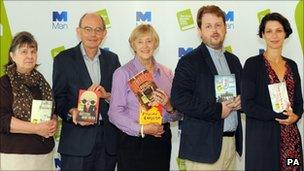Julian Barnes leads race for Booker Prize
- Published
The winner of the Man Booker Prize for literature is revealed later, with four-time hopeful Julian Barnes favourite for The Sense of an Ending.
While this year's shortlist has been the best-selling in Booker history, some in the literary world have accused the prize of becoming too populist.
The other nominees are Carol Birch, Patrick deWitt, Esi Edugyan, Stephen Kelman and AD Miller.
The £50,000 prize winner will be announced at London's Guildhall.
There has been criticism of this year's judges for putting a focus on "readability" of contenders.
"I'd rather it hadn't blown up like this, but 'readability' is a peculiar term," said nominee Birch.
"What one person finds readable the next person might find incredibly boring," Birch told the audience at a Booker event in central London on Monday.
"Readability and quality surely can go hand in hand," added the writer of Victorian adventure Jamrach's Menagerie.
She also said she felt like a student who had passed four A levels only to read in the newspapers next morning that "A levels are all rubbish now".
Five of the six shortlisted authors - Birch, deWitt, Edugyan, Kelman and Miller - attended the event.
Miller, first-time author of Snowdrops, said: "I hope that before people decide whether they are readable, in a good way or otherwise, they will themselves read those books rather than making their minds up beforehand."
Kelman, another debut novelist with Pigeon English, said: "The fact that I could be here because people want to read something I've written is a huge privilege for me and something I'm not going to bemoan in any way."

Booker 2011 judges: (l-r) Susan Hill, Chris Mullin, Dame Stella Rimington, Matthew d'Ancona, and Gaby Wood
Bookmakers William Hill and Ladbrokes both have Barnes to win, with Birch's Jamrach's Menagerie as second favourite.
"We are bracing ourselves for a Booker battering as literary punters seem to believe Barnes is a banker bet," said Hill's spokesman Graham Sharpe.
Previous years have shown, however, that the Booker winner is notoriously hard to predict. Last year Tom McCarthy's C had been the favourite to win, but the prize went to Howard Jacobson for his comic novel The Finkler Question.
When the final six novels were announced last month, this year's chair of judges, Dame Stella Rimington, said the focus was on readability.
"We wanted people to buy these books and read them, not buy them and admire them," said the former MI5 chief turned novelist.
But critics accused the Booker judges of dumbing down, and one group of literary leading lights announced a rival award, The Literature Prize.
The award's backers claimed the Booker "now prioritises a notion of 'readability' over artistic achievement".
Ion Trewin, the Booker's literary director, dismissed the announcement as "a minor distraction".
"Do I detect sour grapes in some of those who support the possibility of a new literary prize, said to be a rival to the Man Booker?," he wrote in the Telegraph on Monday.
Bestselling shortlist
But this year's judges faced more criticism from Sir Andrew Motion, who chaired the Booker panel in 2010.
The former poet laureate told The Guardian the focus on readability "opens up a completely false divide between what is high end and what is readable, as if they are somehow in opposition to one other, which is patently not true".
Earlier in October, the New Statesman's lead fiction reviewer Leo Robson wrote: "If things continue as they are, it isn't hard to imagine a time when the prize will be seen as a way not of celebrating novels, just of selling them."
William Hill said more than 50% of all bets on the Man Booker Prize had been for Barnes, who has been shortlisted for the prize on three previous occasions, but without success.
The 65-year-old was nominated in 1984 for Flaubert's Parrot, in 1998 for England, England and in 2005 for Arthur and George.
The Booker nominees read excerpts from their works
The Sense of an Ending has a middle-aged man reflecting on the paths he and his childhood friends have taken as the past catches up with him via a bequeathed diary.
This year's shortlist contains two debut novelists, Miller and Kelman, as well as two women - Edugyan and Birch. Two of the authors are Canadian - Edugyan and deWitt - while the other four are British. Four of the novels are from independent publishers.
Kelman's Pigeon English tells the story of an 11-year-old boy - recently arrived from Ghana - who investigates the murder of a local boy on a tough London estate.
Snowdrops, the story of an English lawyer's moral meltdown in Moscow, was inspired by his time spent living and working in Russia.
Edugyan's Half-Blood Blues begins in 1930s Berlin with a jazz musician going missing as the Nazis take over the streets.
The Sisters Brothers, deWitt's second novel, is set against the backdrop of the 1850s Californian gold rush and is believed to be the first Western novel to feature on the shortlist.
Jamrach's Menagerie begins in the slums of Victorian London and sends its protagonist Jaffy Brown on a whale ship bound for the Indian Ocean.
Sales of the six novels have exceeded those of any other Booker shortlist.
According to Nielsen BookScan, 98,876 copies of the books have been sold between 4 September and 8 October, compared to 52,729 last year.
Snowdrops has been the bestselling book, shifting more than 28,500 copies.
In the same period, Jamrach's Menagerie sold more than 16,500 copies, The Sense of An Ending 12,500, Pigeon English 10,300, The Sisters Brothers 7,600, and Half Blood Blues almost 6,400.
Rimington's fellow Booker judges are writer and journalist Matthew d'Ancona, author Susan Hill, author and politician Chris Mullin and Gaby Wood of the Telegraph.
- Published18 October 2011
- Published13 October 2011
- Published6 September 2011